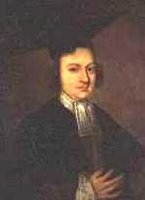I Will Consider My Cat Jeoffrey

Poet Christopher Smart was born on this day in 1722 in Shipbourne, Kent, England.
Entering Pembroke College, Cambridge in 1739, Smart spent ten years as a visibly successful poet and scholar, while at the same time indulging his interests in fine clothes and heavy drinking. Plagued by debts, he left Cambridge in 1749 for London and the life of a professional writer. He edited and wrote for a number of London literary magazines, including the Student (1750-51), the Midwife (1750-53), and, under a notorious 99-year contract, the Universal Visiter.
In 1752 he independently published some of his light, witty poems (Poems on Several Occasions) which were highly regarded among London's aesthetic elite (subscribers included Thomas Arne, Samuel Richardson and Voltaire). He fell ill during the early 1750s and piled on more debts, leading him to accept a commission for a prose translation of Horace (1755) which became a standard school text.
From 1756 to 1763, his disintegrating mental health drove him to confinement in St. Luke's Hospital and in private asylums, his insanity manifested by religious mania, a literal understanding of St. Paul's commandment to "pray without ceasing." As Samuel Johnson observed: "My poor friend Smart shewed the disturbance of his mind, by falling upon his knees, and saying his prayers in the street, or in any other unusual place. Now although, rationally speaking, it is greater madness not to pray at all, than to pray as Smart did, I am afraid there are so many who do not pray, that their understanding is not called into question."
It was during this period, however, that Smart produced the offbeat religious poetry for which he would be remembered. Jubilate Agno (1759-63) was his major work during the period, an exmaple of Smart's mission to revitalize the poetry of praise in imitation of his literary hero, David, the author of the biblical Psalms. The best known segment of Jubilate Agno concerns Smart's cat Jeoffrey ("For I will consider my cat Jeoffrey/ for he is the servant of the living God duly and daily serving him . . ."), in which Smart's Zen-like description of his cat's routine bathing and feeding reveals the divine rituals of the cat's praise of God. His contemporaries were puzzled by his later work -- though Boswell wrote that his A Song to David (1763) was "a very curious composition, being a strange mixture of dun obscure and glowing genius at times" -- and in his final years, Smart was ignored by critics and hounded by creditors. He wrote his final work, Hymns for the Amusement of Children (1770) from debtor's prison. He died in May 1771.
For many years, Smart the mad-poet seemed to be one of English literature's dirty little secrets, but Smart has emerged in the 20th century as a poet of unusual vision and coherent artistry. Benjamin Britten composed an oft-performed setting of portions of Jubilate Agno (as Rejoice in the Lamb, Op. 30) in 1943.
Categories: Literature





0 Comments:
Post a Comment
Subscribe to Post Comments [Atom]
<< Home